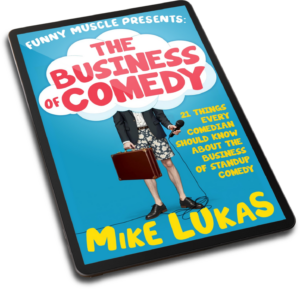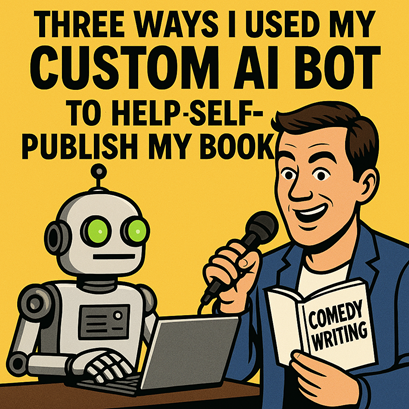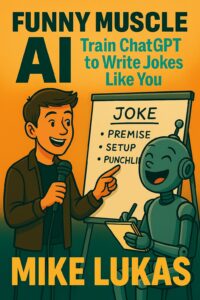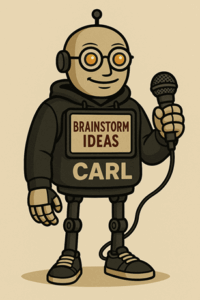When I tell people I self published a book with the help of AI, they immediately picture some robotic ghostwriter named Carl pounding out my punchlines while I sip espresso and count royalties. Nope.
I wrote every sentence. Carl just wore the headset, pulled focus, and ran point on all the boring-but-critical parts that make books visible. Like an unpaid intern with an encyclopedic brain, infinite coffee, and zero bathroom breaks.
Here are the three real ways Carl helped me self-publish my book—without ever writing a word of it.
1. Carl Wrote My Amazon Description Like a PR Intern With a Sales Commission
You know what’s harder than writing 200 pages of comedy instruction? Summarizing those pages in 200 words that don’t suck.
Amazon book descriptions are brutal. They’re the Tinder bios of self-publishing: too vague and nobody swipes, too detailed and people fall asleep mid-scroll. So I fed Carl the good stuff—my audience, my book goals, my tone—and told him to help me sell the benefits, not the features.
Carl immediately switched into marketing beast mode.
He gave me descriptions that:
Used bold verbs and punchy phrasing to hook fast readers
Focused on what the reader would gain, not what I wrote
Included optimized keywords like “how to be funny,” “comedy writing for beginners,” and “stand-up comedy tips” without sounding like an SEO junk drawer
Avoided lazy clichés (no “this book will change your life” garbage)
I wrote the book to teach people how to be funny; Carl wrote the description so people actually read the damn thing.
2. Carl Helped Me Nail My Amazon Categories (aka, Where’s Waldo but With Royalties)
Picking the right Amazon categories is like playing three-dimensional chess with invisible opponents.
Go too broad—”Humor & Entertainment”—and you’re buried beneath a thousand cat meme journals. Go too narrow—“Jokes About Accountants Who Garden”—and your only review is from Uncle Bert in Boise.
Carl helped me cast a wide net while still looking like I belonged on the shelves I landed on.
I asked him: “Where should this comedy book live?”
He responded like an algorithm-savvy librarian who’d snorted Goodreads for breakfast:
Carl cross-referenced Amazon’s existing categories with top-performing books in similar niches
He prioritized categories with enough traffic to sell but low enough competition to rank
Carl helped me split the book’s angles: “Performing Arts > Comedy,” “Self-Help > Creativity,” and even “Writing > Humor Writing”
I didn’t just want to sell books—I wanted to rank high enough to show up in that coveted “Customers Also Bought” scroll zone. Carl’s category sleuthing got me there.
3. Carl Pulled Keywords Out of the Air Like a Vegas Mentalist
Let’s talk keywords. The oxygen of online books. Miss them, and your masterpiece drowns at sea with 400,000 other titles titled “Be Funny Now!”
Keywords are how the right reader stumbles onto your work while searching “how to do standup” at 2 a.m. on a shame spiral after bombing at open mic night.
I asked Carl to dig deep.
He didn’t just spit out generic search terms like “comedy book” or “joke writing.” Carl knew my audience—aspiring comics, funny speakers, corporate presenters—and delivered real buyer phrases:
“how to get better at comedy”
“comedy writing structure”
“funny speeches for work”
“how to get booked at a comedy club”
“humor blueprint joke writing”
Carl organized them by:
Relevance
Search volume
Competition
Long-tail gold (the hidden gems like “funny talk tips for introverts”)
Then he helped me sprinkle them into the title, subtitle, and backend metadata like he was seasoning a steak. The result? A findable book in a noisy market.
TL;DR: Carl Didn’t Write My Book—He Got It Noticed
I didn’t trust AI to write my punchlines—but I definitely trusted it to make sure people saw them.
Self-publishing isn’t just about content. It’s about getting discovered, which means:
Writing a killer book description that sells outcomes, not table of contents
Landing in the right categories so browsers become buyers
Optimizing your keywords like a stealth marketer with a thesaurus addiction
That’s where Carl came in. I wrote the jokes. He cleared the digital path so they could be found, read, and shared.
If you’re a writer thinking about publishing, don’t let your ego keep you from using AI as your backstage crew. Carl didn’t touch a single punchline. But without him, half of my readers might never have laughed at them.
Want to train your own Carl?
Click here to grab the Funny Muscle AI guide in order to train ChatGPT to write jokes like you.
Or better yet, buy Carl installed already in the Custom GPT called Carl Aibot.
Either way, turn ChatGPT into your joke-writing, description-pitching, keyword-busting comedy intern today.
Get your FREE copy of The Business of Comedy!
21 Things Every Comedian Should Know About the Business of Standup Comedy

Includes:
- How Comedians are 5-Tool Players
- How to Attract a Following
- How to Get Bookings
- How to Create Multiple Income Streams
- Manager vs Agent
- And More!






![Read more about the article THINKIN’ FUNNY [3]: Serious People Lack this Thinkin’ Funny Fundamental](https://mike-lukas.com/wp-content/uploads/2021/06/Combininng-Worlds-300x202.png)
![Read more about the article THINKIN’ FUNNY [4]: Difference Between Saying Funny Things and Saying Things Funny](https://mike-lukas.com/wp-content/uploads/2021/06/Don-Rickles-300x250.jpg)